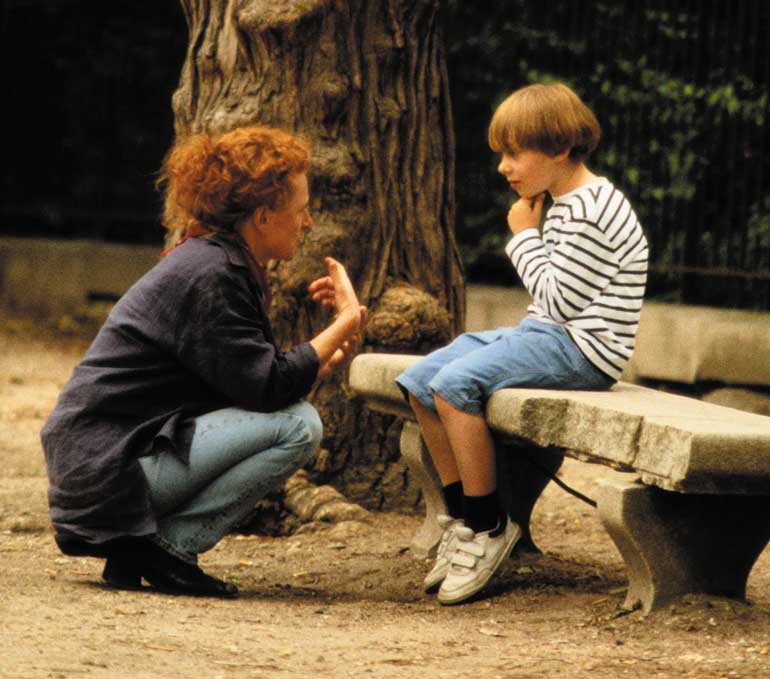If we aren’t straight with our children about their past, they will pick up on it and fantasize something that may be much worse. —Carol Williams, University of North Carolina
She approached the adoption speaker tentatively, waiting until the last person asked his question and the room cleared. She wanted no one to hear her question.
“Excuse me,” she said to the speaker, “I need to ask you something. My son is seven years old, almost eight. He came to us through a public agency at the age of seven months.
“We were told that he is the product of an incestuous relationship between a brother and sister. He doesn’t seem to have any major problems or difficulties. This is something we never have to tell him, right?”
This adoptive mom, like hundreds of adoptive parents, holds a secret to her child’s past. She looks at the information from every angle, inside and out, upside down and right side up, hoping to find a way to avoid disclosing it. Yet the moment of disclosure is inevitable, unavoidable.
Imparting such information is difficult. The details seem too painful. Yet those distressing pieces — the missing pieces — are often the ones that are needed to fill in the blanks in a jumbled perception of the past.
For many children, the facts come as a relief. Especially for older children, it affirms the emotional reality for which they have only vague memories.
“Children most often know the truth — they lived it,” says Greg Keck, an internationally recognized authority on attachment and bonding. “We need to validate their truth, document their truth, and, where possible, show them the truth.
“I think that in our efforts to protect hurt children, we want things to be nice. As a result, we want to reframe things so that they are comfortable enough for us to tolerate. In doing this, we often leave [children] incomplete, confused, and more unclear than they were.”
When a child says “I hate my birth mom,” it’s better for a parent to affirm this by saying “I know” or “I bet you do.” Instead, I have heard people say things like “Oh, Bobby, they had so many problems of their own, they just couldn’t take care of you. They drank. They used drugs.” This response seems to explain and — even worse — excuse their behavior.
In working with kids, we want them to stop projecting blame and externalizing the causes of their problems and misbehavior. If a child thinks he “hates” someone, the worst response we can give is some reason that he should not.
Knowing that sharing the hard stuff is the right thing to do is one thing. Knowing how to do it is another. Just how does a parent carry out this challenging task? Here are three examples.
Josh’s Story: Abandonment
His adoptive parents have very little information about Josh, his birth family, or any other background. They do not even have his exact birthdate. Josh was found one warm summer morning on the steps of the police station in his small Korean town. He looked just a few days old. A note was taped to his blanket. “I am young and alone. I cannot care for him.” Someday his parents must attempt to tell Josh his story — without much knowledge or information to help them.
For thousands of children adopted internationally and some domestically, “abandoned” is the word that sums up their history. No name. No identifying information. Nothing. How does a family relay that information to a child?
Dee Paddock, a respected therapist and adoptive parent, says that adoptive parents need to see sharing their child’s story as a process of telling and understanding — not just relating an event.
“Whatever happened in the child’s life that led to adoptive placement, from the very beginning and in every stage, they need to hear the words ‘your birth parent could not parent you,'” says Paddock. From that point on, parents can build the story incrementally.
If a child was abandoned at birth or early in life, Paddock suggests telling the story in the following stages:
Preschool years:
“Your birth mother couldn’t take care of you, but she wanted you to be safe. So she found a safe place to put you where other adults would take care of you.”
Elementary years:
“We feel sad sometimes, and even mad sometimes, that we cannot give you any more information. Do you ever have any sad or mad feelings about not knowing anything? It is important to understand that you are not responsible for the decision your parents made.”
Middle School Years:
“Although we do not have specific information about your birth parents, we can study your country and try to understand why birth parents had to make such difficult decisions. When you think about your birth parents, what do you think about? Are you ever sad or angry that you don’t know anything about them?” Parents can begin to bring up the societal, economic, and cultural aspects of their child’s country that would force birth parents to make such a decision.
Teenage Years:
Continue using educational resources to fill in cultural and ethnic background. Continue to ask the above questions in greater depth. Consider a support group of other adopted teens that openly discusses adoption.
Additional points:
- Rough periods for children can create real growth and understanding.
- One of the most helpful experiences for internationally adopted children is a homeland tour. Many return with a deeper understanding of their adoption. “They see real people who had to make real-life decisions,” Paddock comments. “Then they realize that they fit more into the country they grew up in than the one in which they were born.”
Marty’s Story: Substance Abuse
Marty, age six, was removed from her alcoholic mother after five years of neglect. Her mother would provide marginally acceptable care when sober, but she would often drink cheap wine until she passed out on the couch. Her blackouts lasted for hours, leaving Marty terrified and alone. When she could not rouse her mother, she feared her mother had died. No amount of crying or shaking could waken her. After termination of parental rights and adoptive placement, Marty adjusted beautifully. Her adoptive family thought that her difficulties were resolved until, one night, they served wine with dinner. Marty took a look at the wine bottle and became hysterical. She was absolutely inconsolable, associating wine with abandonment and lack of nurturing. Someday her parents will need to help Marty understand the ravages of alcoholism.
Even very young children placed for adoption may have vague memories of what life was like with someone who abused alcohol or drugs. Children need the opportunity to voice their feelings about memories. Children often have lingering fears of what it was like to live with someone who was chronically absent or abusive or spaced out. What follows can be adapted to explain alcoholism or drug abuse.
Preschool years:
“Your first mommy took some medicine that wasn’t good for her. She didn’t get this medicine from the doctor, and it wasn’t good for her. She took it because she thought it would help her feel good, but she was wrong. When she took the medicine, she didn’t feel good, and she couldn’t take care of you. You need a forever family to keep you safe. That’s why you are with us.”
Early elementary years:
“Your first mommy made some bad choices before you were even born (when you were very little). She listened to a bad person who said she would be happier if she took drugs. This bad person, a dealer, wanted to make money by selling drugs to people. Once people start taking drugs, it is very hard for them to stop. They feel really bad whenever they try to stop. When your birth mom tried the drugs, she did feel better for a little while and thought the bad person, the dealer, was right! But the dealer did not tell her how bad she would feel when she stopped taking the drugs. And the dealer did not tell her she would not be able to take care of you, or any children, when she was using drugs because she would be too sleepy. You need to be with a family that can always make sure you have a safe place and good food to eat. That’s why you will always be with us.”
Middle school years and beyond:
“Your birth mom got hooked on drugs (or alcohol) because she listened to the wrong people and made some bad choices. What do you remember about that time? How do you feel about it now? What questions do you still have?”
Additional points:
- “You did not cause your parent’s drinking or drug problem.”
- “Your parent treated you as she did because drugs or alcohol controlled her.”
- “Just because mom or dad did not always treat you as a child should be treated, that doesn’t mean he or she doesn’t love you.”
- “Your parents did not have control over their lives and couldn’t give you a safe, happy, secure place.”
- “You need to grow up in a home where you can be safe from harm.”
Kristy’s Story: Criminal Behavior
Kristy’s life was never quiet. There were always a lot of people who came at all hours of the day and night. Her parents had a home business that provided money for the family. It wasn’t a legal business but a dangerous one. Her parents would steal cars, repaint them to sell on the black market, or tear them down and sell the parts. Late on a warm fall evening, Kristy’s life changed forever. An undercover police officer came to their home to “buy” a car. After the transaction was completed, he arrested both her parents. At age four and a half, Kristy entered foster care and was eventually placed for adoption. Someday her parents will need to explain to her the circumstances of her past.
Opening the door to discuss lawbreaking can begin early. Here is what parents can say to their children.
Preschool years:
“Do you know how we have rules in our family? Some rules are so important that they are called laws. Everyone has to obey laws, even grown-ups. Can you think of any laws? When big people don’t follow these rules, called laws, they have to go away to a special time-out place to learn how to behave better. You need to have a forever family to keep you safe. That’s why you will be here with us until you grow up.”
Early elementary years:
“Your birth dad broke the law and had to see a judge. The law your birth dad broke was —— (stealing cars from other people, selling drugs to other people, etc.) The judge decided that your birth dad had to think about the bad choices he made, so the judge sent your birth dad to jail to think about it. He will be there for —– years. You cannot wait that long for a family — you need a family to love you and keep you safe now! That’s why you will be with us until you are grown up.”
Middle school years and beyond:
“Your birth mom probably wishes now that she had made a different decision when she was younger so that she didn’t have to be separated from you. She loves you very much and is probably worried that you will be angry at her or, even worse, will forget her. How do you feel about your mom? What questions do you have about your birth family?”


